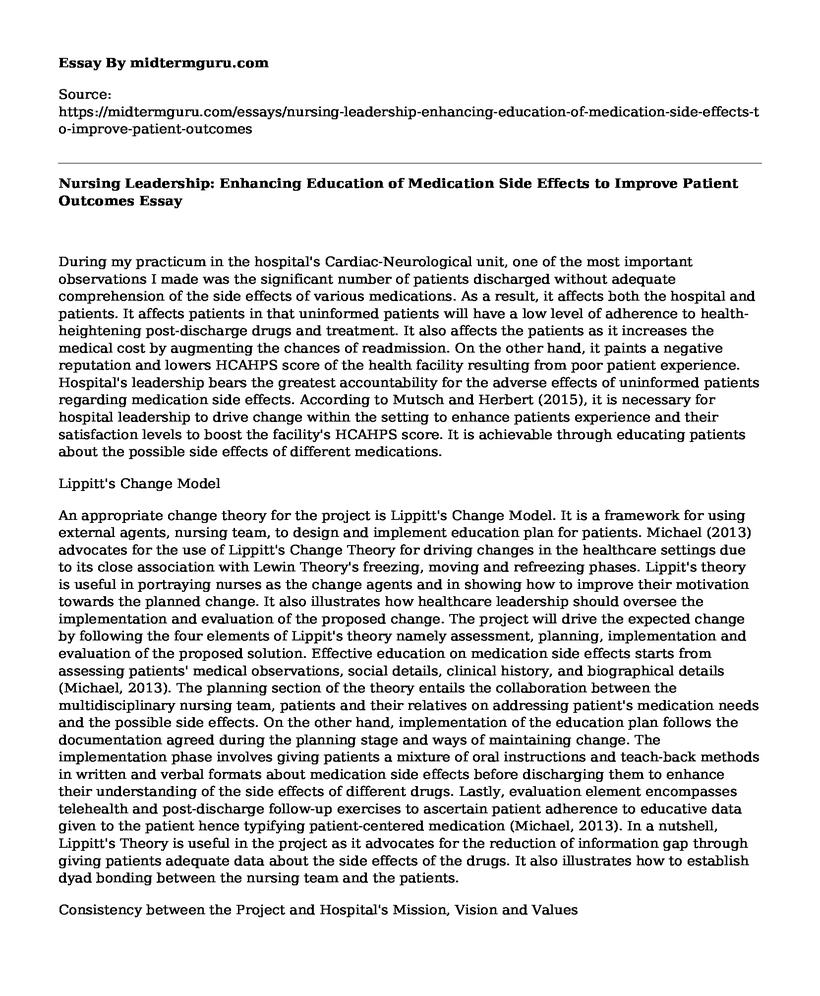During my practicum in the hospital's Cardiac-Neurological unit, one of the most important observations I made was the significant number of patients discharged without adequate comprehension of the side effects of various medications. As a result, it affects both the hospital and patients. It affects patients in that uninformed patients will have a low level of adherence to health-heightening post-discharge drugs and treatment. It also affects the patients as it increases the medical cost by augmenting the chances of readmission. On the other hand, it paints a negative reputation and lowers HCAHPS score of the health facility resulting from poor patient experience. Hospital's leadership bears the greatest accountability for the adverse effects of uninformed patients regarding medication side effects. According to Mutsch and Herbert (2015), it is necessary for hospital leadership to drive change within the setting to enhance patients experience and their satisfaction levels to boost the facility's HCAHPS score. It is achievable through educating patients about the possible side effects of different medications.
Lippitt's Change Model
An appropriate change theory for the project is Lippitt's Change Model. It is a framework for using external agents, nursing team, to design and implement education plan for patients. Michael (2013) advocates for the use of Lippitt's Change Theory for driving changes in the healthcare settings due to its close association with Lewin Theory's freezing, moving and refreezing phases. Lippit's theory is useful in portraying nurses as the change agents and in showing how to improve their motivation towards the planned change. It also illustrates how healthcare leadership should oversee the implementation and evaluation of the proposed change. The project will drive the expected change by following the four elements of Lippit's theory namely assessment, planning, implementation and evaluation of the proposed solution. Effective education on medication side effects starts from assessing patients' medical observations, social details, clinical history, and biographical details (Michael, 2013). The planning section of the theory entails the collaboration between the multidisciplinary nursing team, patients and their relatives on addressing patient's medication needs and the possible side effects. On the other hand, implementation of the education plan follows the documentation agreed during the planning stage and ways of maintaining change. The implementation phase involves giving patients a mixture of oral instructions and teach-back methods in written and verbal formats about medication side effects before discharging them to enhance their understanding of the side effects of different drugs. Lastly, evaluation element encompasses telehealth and post-discharge follow-up exercises to ascertain patient adherence to educative data given to the patient hence typifying patient-centered medication (Michael, 2013). In a nutshell, Lippitt's Theory is useful in the project as it advocates for the reduction of information gap through giving patients adequate data about the side effects of the drugs. It also illustrates how to establish dyad bonding between the nursing team and the patients.
Consistency between the Project and Hospital's Mission, Vision and Values
The project's objective of improving patient outcomes is threefold; reducing readmission costs, increasing patient satisfaction, and lowering their adherence to health-optimizing post-charge medications. The leadership-based initiative impact on facility's HCAHPS score, nursing safety and quality hence supporting the hospital's mission regarding the provision of efficient and effective services tailored to satisfy community needs in a professional, caring and skillful manner. It also impacts on the hospital's vision of being the global leader in offering caring, collaborative and cutting-edge healthcare. The hospital strives to uphold values such as integrity, teamwork, stewardship, excellence and compassion which are in line with the dispensation of the project's framework.
References
BIBLIOGRAPHY Michael, G. (2013). Selecting the Best Theory to Implement Planned Change. Nursing Management, 20(1): 32-37.
Mutsch, K., & Herbert, S. (2015). Medication discharge planning prior to hospital discharge. The Quality Management Journal, 17(5):25-35.
Cite this page
Nursing Leadership: Enhancing Education of Medication Side Effects to Improve Patient Outcomes. (2021, May 28). Retrieved from https://midtermguru.com/essays/nursing-leadership-enhancing-education-of-medication-side-effects-to-improve-patient-outcomes
If you are the original author of this essay and no longer wish to have it published on the midtermguru.com website, please click below to request its removal:
- Planning and Allocation of Work - Paper Example
- Research Paper on Supporting Young Mothers
- Paper Example on Cultural Control and Its Effect on Management Control System Within International Organizations
- Reasons Why People Should Be Vaccinated - Argumentative Essay
- Retroflexibility & Stroke: A Retrospective Study - Essay Sample
- A Look Back at Brigham and Women's Hospital's Exploits in Health Care - Essay Sample
- Reflective Essay on Summer Internship







